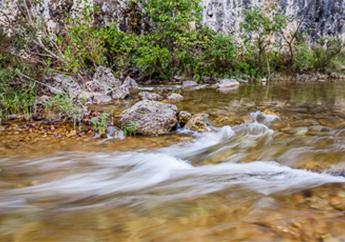
The department is statutorily required to enforce the Missouri Clean Water Law, its implementing regulations and associated Missouri State Operating Permits, which are issued by the department's Water Protection Program. Department staff provide guidance and advice regarding water pollution control issues, such as spills, fish kills, animal waste issues and environmental issues such as flood or drought. The Water Protection Program coordinates efforts with department regional office staff to monitor compliance and provide compliance assistance to regulated facilities and sites across Missouri.
The department's main goal is to achieve regulatory compliance with environmental laws. The Water Protection Program's compliance and enforcement team provides compliance assistance to the regulated public in an effort to reduce and prevent violations. Staff do this in various ways, including notifying permittees about missing Discharge Monitoring Reports, expired permits and other non-compliance issues. Staff also work with regional office staff and other environmental professionals to identify permittees that need assistance to regain compliance.
If compliance assistance efforts do not bring compliance and violations continue, the compliance and enforcement team starts formal enforcement actions to encourage or compel compliance. Staff use compliance monitoring data reported by the permit holder and enforcement data, and coordinates with regional office staff to identify significant non-compliance. Facilities are prioritized for Notices of Violation, follow up inspections and enforcement actions to correct the violations.
The Water Protection Program's compliance and enforcement team manages a large variety of cases referred by the regional offices, including but not limited to land disturbance sites, municipal and non-municipal wastewater treatment facilities and associated collection systems, industrial stormwater sites and confined animal feeding operations. When cases are referred, compliance and enforcement staff communicate with the regulated parties and their attorneys to negotiate a mutually agreeable resolution through an Abatement Order on Consent. If a mutually agreeable resolution cannot be negotiated, the department may issue a Unilateral Order requiring compliance. If a violator fails to comply with an agreed or issued order, compliance and enforcement staff may request that the matter be referred to the Missouri Attorney General’s Office to compel compliance through litigation.
The Water Protection Program's compliance and enforcement team staff produce a number of reports for public use, which are posted below. Compliance information is also available to the public in the department's Missouri Clean Water Information System (MoCWIS). For information about all department compliance assistance and enforcement actions, visit Compliance Assistance and Enforcement.
